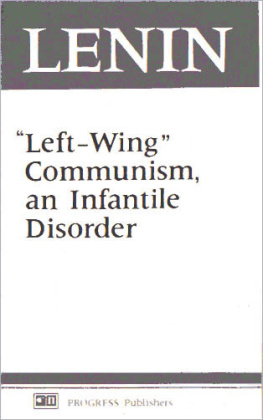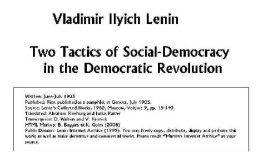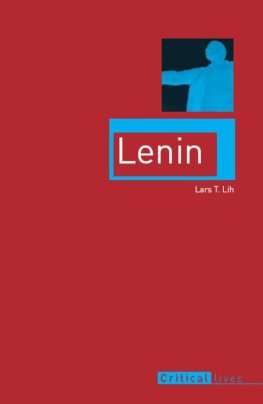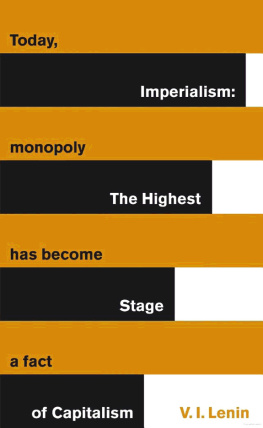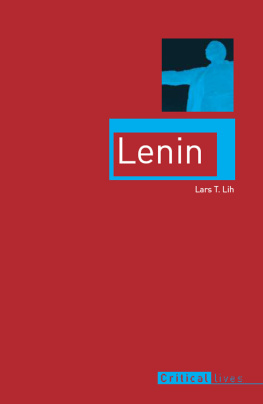Vladimir Ilyich Lenin - Karl Marx
Here you can read online Vladimir Ilyich Lenin - Karl Marx full text of the book (entire story) in english for free. Download pdf and epub, get meaning, cover and reviews about this ebook. year: 2014, publisher: Marxists Internet Archive, genre: Politics. Description of the work, (preface) as well as reviews are available. Best literature library LitArk.com created for fans of good reading and offers a wide selection of genres:
Romance novel
Science fiction
Adventure
Detective
Science
History
Home and family
Prose
Art
Politics
Computer
Non-fiction
Religion
Business
Children
Humor
Choose a favorite category and find really read worthwhile books. Enjoy immersion in the world of imagination, feel the emotions of the characters or learn something new for yourself, make an fascinating discovery.
- Book:Karl Marx
- Author:
- Publisher:Marxists Internet Archive
- Genre:
- Year:2014
- Rating:3 / 5
- Favourites:Add to favourites
- Your mark:
- 60
- 1
- 2
- 3
- 4
- 5
Karl Marx: summary, description and annotation
We offer to read an annotation, description, summary or preface (depends on what the author of the book "Karl Marx" wrote himself). If you haven't found the necessary information about the book — write in the comments, we will try to find it.
Karl Marx — read online for free the complete book (whole text) full work
Below is the text of the book, divided by pages. System saving the place of the last page read, allows you to conveniently read the book "Karl Marx" online for free, without having to search again every time where you left off. Put a bookmark, and you can go to the page where you finished reading at any time.
Font size:
Interval:
Bookmark:
Karl Marx
A Brief Biographical Sketch With an Exposition of Marxism
Vladimir Ilyich Lenin
Written: 1914
Source: Lenins Collected Works, Moscow, 1974, Volume 21, pp. 43-91.
Publisher: Progress Publishers
Published: First published 1915 in the GranatEncyclopaedia, Seventh Edition, Vol. 28, over the signature of V. Ilyin. Published according to the manuscript, checked against the text of the pamphlet of 1918.
Translated: Clemence Dutt
Edited: Stewart Smith
Original Transcription: Zodiac
Transcription\Markup: D. Walters, B. Baggins, R. Cymbala, and Kevin Goins
Public Domain: Lenin Internet Archive (marxists.org) 2005. You may freely copy, distribute, display and perform this work; as well as make derivative and commercial works. Please credit Marxists Internet Archive as your source.
HTML Version: http://marxists.org/archive/lenin/works/1914/granat/index.htm
Converted to eBook format by: Sajjan Singh (2014)
Contents
Lenin wrote this article for the Encyclopaedia Dictionary published by the Granat Brothers, which was then the most popular in Russia. In the preface for the pamphlet edition in 1918 Lenin gave the date of writing as 1913, from memory. Actually, he began it in the spring of 1914 in Poronin, but had to interrupt it, being too busy with his work guiding the Party and the newspaper Pravda. Lenin resumed his work on the article only in September that year, after he had moved to Berne, and finished it in the first half of November.
The article was published in 1915 in Volume 28 of the Dictionary with Bibliography of Marxism appended to it; it was signed V. Ilyin. For censorship reasons, the editors omitted two chapters: Socialism and Tactics of the Class Struggle of the Proletariat and made a number of changes in the text.
In 1918, the Priboi Publishers put out the article in pamphlet form exactly as published in the Dictionary but without the Bibliography.
The full text of the article according to the manuscript was first published by the Lenin Institute of the C.P.S.U. Central Committee in the collection of Lenins articles Marx, Engels, Marxism, which appeared in 1925.
Note that this document has undergone special formatting to ensure that Lenins side notes fit on the page, marking as best as possible where they were located in the original manuscript.
This article on Karl Marx, which now appears in a separate printing, was written in 1913 (as far as I can remember) for the Granat Encyclopaedia. A fairly detailed bibliography of literature on Marx, mostly foreign, was appended to the article. This has been omitted in the present edition. The editor of the Encyclopaedia, for their part, have, for censorship reasons, deleted the end of the article on Marx, namely, the section dealing with his revolutionary tactics. Unfortunately, I am unable to reproduce that end, because the draft has remained among my papers somewhere in Krakow or in Switzerland. I only remember that in the concluding part of the article I quoted, among other things, the passage from Marxs letter to Engels of April 16, 1856, in which he wrote: The whole thing in Germany will depend on the possibility of backing the proletarian revolution by some second edition of the Peasant War. Then the affair will be splendid. That is what our Mensheviks, who have now sunk to utter betrayal of socialism and to desertion to the bourgeoisie, have failed to understand since 1905.
N. Lenin
Moscow, May 14, 1918
NOTE: Published in 1918 in the pamphlet: N. Lenin,
Karl Marx,Priobi Publishers, Moscow
Published according to the manuscript

Marx, Karl, was born on May 5, 1818 (New Style), in the city of Trier (Rhenish Prussia). His father was a lawyer, a Jew, who in 1824 adopted Protestantism. The family was well-to-do, cultured, but not revolutionary. After graduating from a Gymnasium in Trier, Marx entered the university, first at Bonn and later in Berlin, where he read law, majoring in history and philosophy. He concluded his university course in 1841, submitting a doctoral thesis on the philosophy of Epicurus. At the time Marx was a Hegelian idealist in his views. In Berlin, he belonged to the circle of Left Hegelians (Bruno Bauer and others) who sought to draw atheistic and revolutionary conclusion from Hegels philosophy.
After graduating, Marx moved to Bonn, hoping to become a professor. However, the reactionary policy of the government, which deprived Ludwig Feuerbach of his chair in 1832, refused to allow him to return to the university in 1836, and in 1841 forbade young Professor Bruno Bauer to lecture at Bonn, made Marx abandon the idea of an academic career. Left Hegelian views were making rapid headway in Germany at the time. Feuerbach began to criticize theology, particularly after 1836, and turn to materialism, which in 1841 gained ascendancy in his philosophy (The Essence of Christianity). The year 1843 saw the appearance of his Principles of the Philosophy of the Future. One must oneself have experienced the liberating effect of these books, Engels subsequently wrote of these works of Feuerbach. We [i.e., the Left Hegelians, including Marx] all became at once Feuerbachians. At that time, some radical bourgeois in the Rhineland, who were in touch with the Left Hegelians, founded, in Cologne, an opposition paper called Rheinische Zeitung (The first issue appeared on January 1, 1842). Marx and Bruno Bauer were invited to be the chief contributors, and in October 1842 Marx became editor-in-chief and moved from Bonn to Cologne. The newspapers revolutionary-democratic trend became more and more pronounced under Marxs editorship, and the government first imposed double and triple censorship on the paper, and then on January 1 1843 decided to suppress it. Marx had to resign the editorship before that date, but his resignation did not save the paper, which suspended publication in March 1843. Of the major articles Marx contributed to Rheinische Zeitung, Engels notes, in addition to those indicated below (see Bibliography), Marxs journalistic activities convinced him that he was insufficiently acquainted with political economy, and he zealously set out to study it.
In 1843, Marx married, at Kreuznach, a childhood friend he had become engaged to while still a student. His wife came of a reactionary family of the Prussian nobility, her elder brother being Prussias Minister of the Interior during a most reactionary period1850-58. In the autumn of 1843, Marx went to Paris in order to publish a radical journal abroad, together with Arnold Ruge (1802-1880); Left Hegelian; in prison in 1825-30; a political exile following 1848, and a Bismarckian after 1866-70). Only one issue of this journal , Deutsch-Franzsische Jahrbcher , appeared; and appealed to the masses and to the proletariat .

In September 1844, Frederick Engels came to Paris for a few days, and from that time on became Marxs closest friend. They both took a most active part in the then seething life of the revolutionary groups in Paris (of particular importance at the time was Proudhons they took a prominent part in the Leagues Second Congress (London, November 1847), at whose request they drew up the celebrated Communist Manifesto , which appeared in February 1848. With the clarity and brilliance of genius, this work outlines a new world-conception, consistent with materialism, which also embrace the realm of social life; dialectics, as the most comprehensive and profound doctrine of development; the theory of the class struggle and of the world-historic revolutionary role of the proletariatthe creator of a new, communist society.
Next pageFont size:
Interval:
Bookmark:
Similar books «Karl Marx»
Look at similar books to Karl Marx. We have selected literature similar in name and meaning in the hope of providing readers with more options to find new, interesting, not yet read works.
Discussion, reviews of the book Karl Marx and just readers' own opinions. Leave your comments, write what you think about the work, its meaning or the main characters. Specify what exactly you liked and what you didn't like, and why you think so.


